Advertisement
Future Of Food
How The State's Commercial Food Waste Disposal Ban Is Working
America has a bad habit of wasting food. In fact, about 40% of food in the U.S. never gets eaten.
It starts small: that lonely head of lettuce you've let go limp in your fridge; the leftover casserole that went from savory to slimy.
On a larger level, mounds of food get tossed from restaurant buffets, corporate boardrooms and college cafeterias.
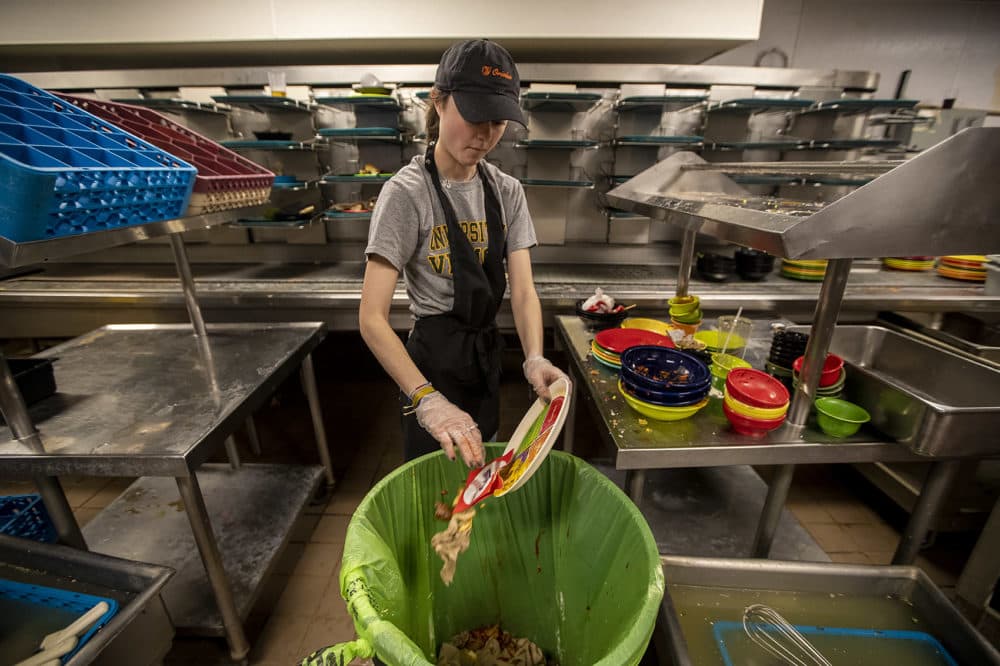
Isabella Ramos, a student at The College of the Holy Cross, knows that like most of us, she wastes food.
"I feel bad because I try to, like, try the new foods here, and I usually end up not liking it, honestly," Ramos says. "And then I put it right on that conveyor belt, and I just see it all just dumped down."
One-fourth of what's thrown into the garbage in Massachusetts is food, according to the state Department of Environmental Protection (DEP); that's the largest portion of the waste stream. The state's landfills are nearing capacity. And as food rots in those dumps, it generates methane — a greenhouse gas that contributes to global warming.
At the same time we toss out so much food, an estimated 616,000 people in the state (about one in 11) are food insecure, according to the Greater Boston Food Bank.
"We have kind of these ironic twin problems of food waste and food insecurity at the same time," says John Fischer, DEP's chief of commercial waste reduction.
Advertisement
In 2014, the agency imposed a commercial food waste disposal ban. Only four other states have similar bans. The regulation says any enterprise that generates one ton or more of food waste a week can't put all of that food in the garbage.
The ban affects an estimated 1,700 places, according to the state — from hospitals to food manufacturers. Those places are doing a range of things to keep food from going in the garbage.
Prioritizing Food Donation
The produce section of Roche Bros. in West Roxbury is a feast for the eyes and the taste buds. Gleaming ruby apples, bell peppers and plump potatoes are stacked high. There are cases filled with containers of berries and cut melons.
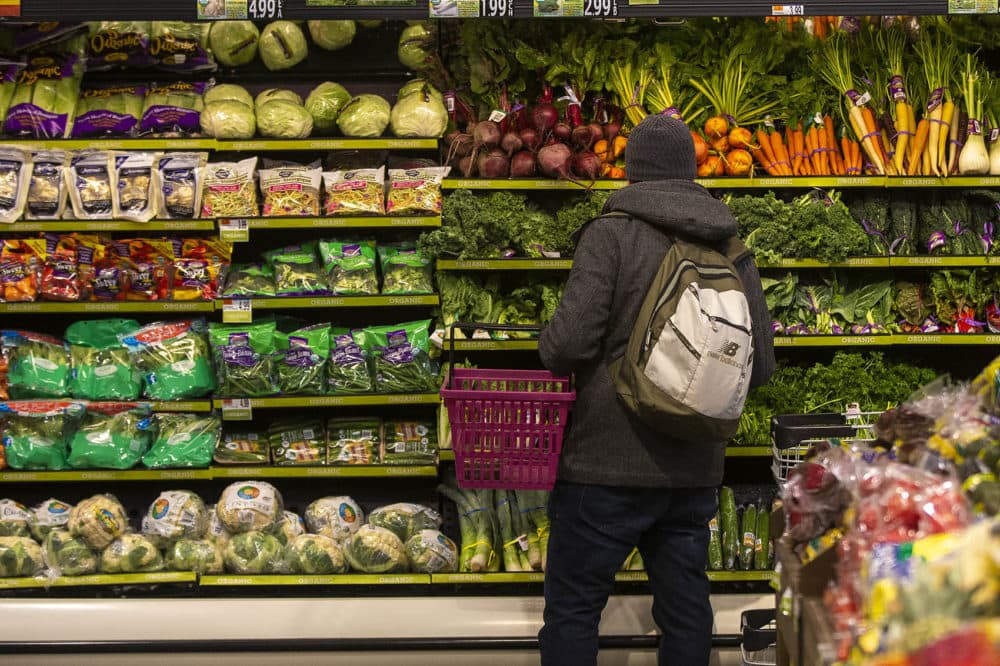
Every day, workers scour the store and pluck out whatever food is about to turn bad or expire. They take perishables to the store's kitchen, where chefs use them in prepared dishes the market sells.
Anything the chefs don't use takes another route to people who can eat it. Five days a week, a truck from Lovin' Spoonfuls arrives at the store. The nonprofit food rescue organization collects edible unsold food and takes it to places that will serve it to people in need — in this case, shelters and addiction treatment centers.
On a recent day, two crew members looked through the boxes full of veggies, French cheese, milk and sandwiches the store had set aside for them.
Jacob Matz, a food rescue coordinator for Lovin' Spoonfuls, says the produce can be a bit brown. What workers are looking for is that there isn't any mold.
The workers weigh their haul. On this day, the group collects 632 pounds of food, turning away just a few pounds of vegetables that are getting mushy or moldy. Store employees put those in a compost bin.
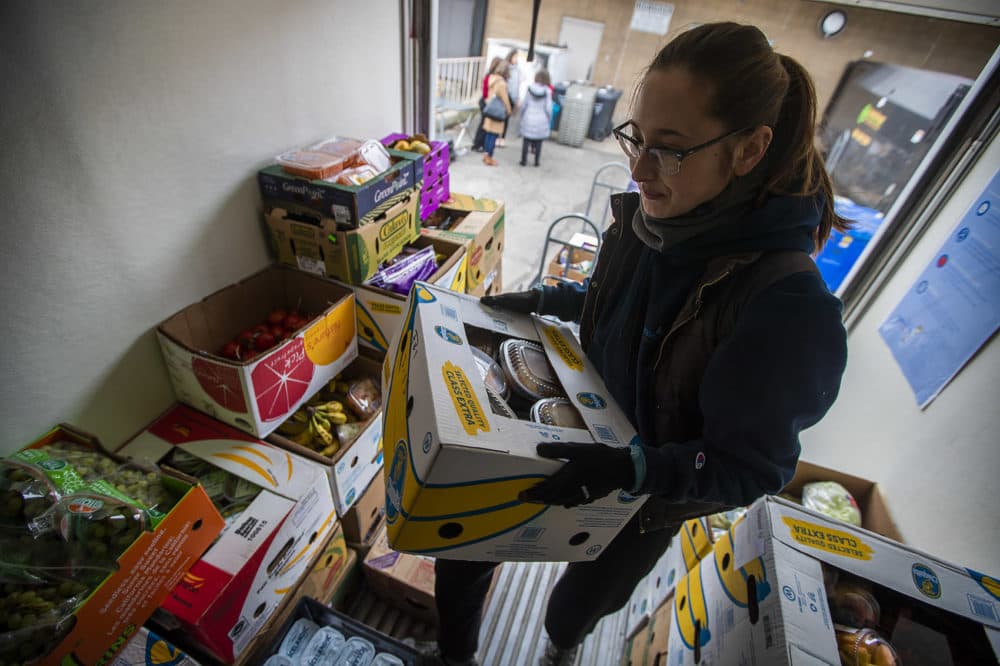
This particular Roche Bros. donates 1,850 pounds of food in an average week. It composts about 2,000 pounds of food waste in the same period, according to a company spokeswoman. Compost ultimately gets converted into fertilizer or energy.
There is a hierarchy for how to prioritize food waste. It's put out by the U.S. Environmental Protection Agency. The EPA says the initial goal is to reduce waste up front. The first priority after that should be to donate unused food to people. Second, send it to farms as animal feed. Third, use it to generate energy. And finally, compost it to create fertilizer.
Managing food waste is a lot of work, says Scott Cristi, manager of the West Roxbury Roche Bros. store.
"I can imagine that some stores would have a tough time that don't have the operation that we have or the size ... to collect it all ... dispose of it properly," Cristi says. "Instead of just taking it and throwing it right in the trash, now you've got to handle it two, three times."
But the store pays nothing to donate food. And having compost hauled away costs less than sending waste to landfills, according to the state.
'Digesting' Food Waste
The grocery giant Stop & Shop takes a more direct approach to getting rid of its food waste and keeping it out of landfills. The company's truckers bring waste from 212 stores to the Stop & Shop distribution center in Freetown. There, the discarded food is turned into energy.
One section of the massive building is a sea of large gray bins full of food. Each bin holds about 900 pounds — one store's food waste from a single day. Workers use forklifts to pick up the bins and dump their contents into a hopper. Machinery adds water to the waste and weeds out packaging materials. Then it feeds the resulting slurry into an anaerobic digester outside.
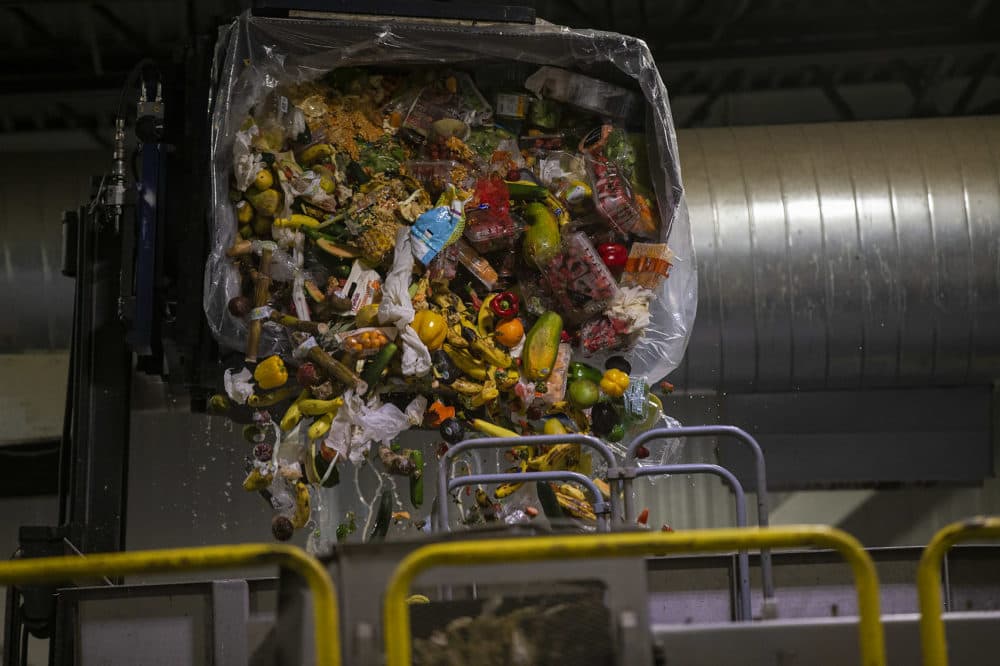
The digester is a three-story tank, and it has to stay full. On an average day, Stop & Shop processes 95 tons of food for it. Inside the oxygen-free tank, the food breaks down and releases methane. The methane is valuable in this setting; it's fed into a generator that produces 40% of the power needed to run the distribution facility.
A majority of the food being "digested" is produce, says Roger Beliveau, Stop & Shop's manager of distribution services.
"Anything that's in these bins is all material that has to be processed into the digester because we couldn't donate it," Beliveau explains. "We couldn't sell it, and it's not anything that a person could consume."
We ask why non-perishables — things like granola bars, which are edible long after their "best by" dates — are in the bins. And why produce isn't pulled from shelves in time to donate it.
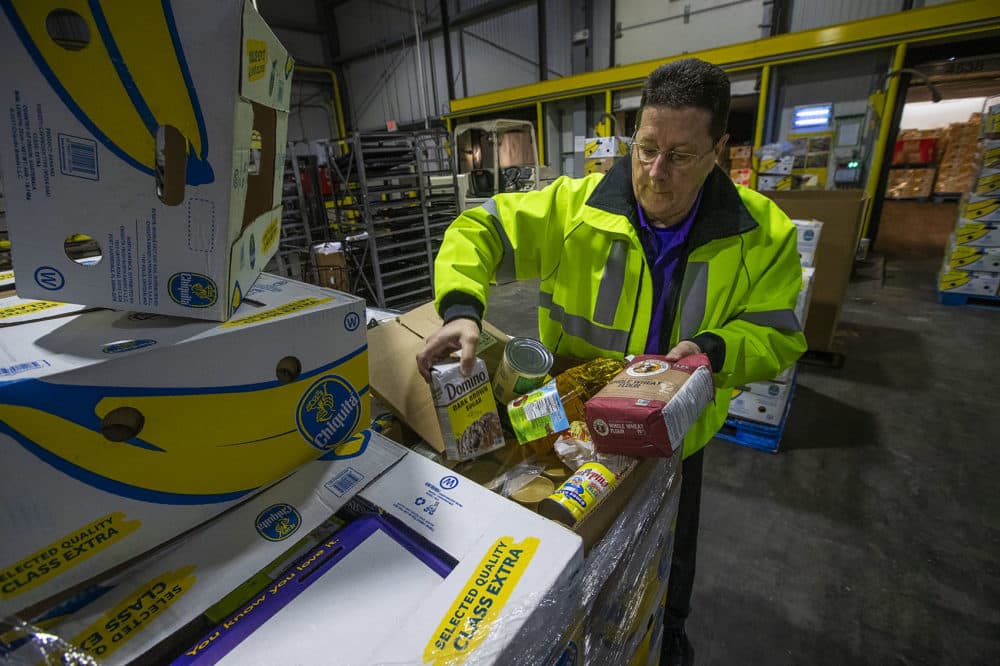
"It's a fine line between pulling it off in time to still be good for the food bank versus trying to sell it to the customer," Beliveau says. "With produce, especially, because it can turn overnight."
Stop & Shop does donate a lot of food. It's the largest donor to the Greater Boston Food Bank. The company says it's working to donate more produce and has set a goal of reducing food waste 50% by 2030.
Jennifer Brogan, Stop & Shop's director of external communications and community relations, says some mistakes can happen at the store level — with food getting discarded and sent to the anaerobic digester instead of being donated — because of employee turnover and the large quantity of goods being handled. She says the company is not shortchanging donations in order to "feed" the digester.
Weaknesses Of The Ban
Some people who work in food rescue say they'd like Massachusetts do more to prioritize donation of food waste.
"There is sort of this broad push to keep food out of landfill. And there is not as much of a push behind working toward higher-level diversion," says Lauren Palumbo, Lovin' Spoonfuls' chief operating officer. "But what we want to make sure is happening is that anything that is still edible is ... used to feed people first."
The state DEP contracts with an outside nonprofit, the Center for EcoTechnology, to run a program called Recycling Works. The program's consultants advise businesses and institutions how to reduce and divert their food waste. Its director of client services, Lorenzo Macaluso, says the program informs clients about all of their options and meets them where they're at.
"What we're seeing is when they start a composting program ... they often realize ... 'Wow, why am I throwing this out in the first place? This is perfectly good,' " Macaluso says. "And it sometimes takes that process to realize just how much donation opportunity there is."
State environmental leaders say since the disposal ban went into effect, overall food donation in the state has increased 22%. Food rescue alone has gone up 60% (from 4,211 tons in 2014 to 6,727 tons in 2017 — the most recent year for which figures are available). The collection and hauling of food for things like anaerobic digestion and composting has gone up 70%.
The DEP set a goal for how much growth it wanted to see in the amount of food being diverted from the waste stream — 350,000 additional tons by the year 2020. According to DEP spokesman Ed Coletta, annual food waste diversion increased by 180,000 tons by 2017 — the most recent year for which DEP has complete data.
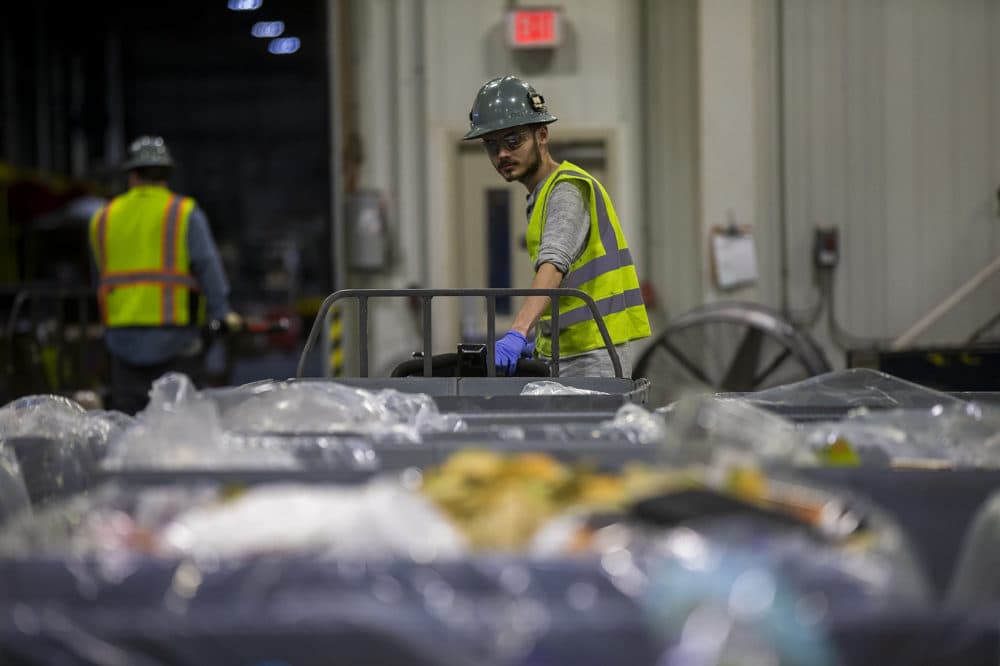
The ban has weaknesses. It doesn't specify how much food waste businesses and institutions have to divert — just that they can't dump one ton per week in the trash. The state has only 11 inspectors who work at least some of their time conducting inspections related to the state's various waste disposal bans (which include materials like cardboard). The inspectors don't have time to go to every affected enterprise. So they go to transfer stations and landfills to see garbage being dumped — and they trace loads that have too much food back to their source.
According to the DEP's John Fischer, this method has some pluses.
"When we go to a busy trash facility and we do a full-day inspection, we can see close to a hundred loads of trash in a day," Fischer says. "And it would be pretty difficult for us to go around and visit a hundred different businesses in a day."
The agency has issued only 49 citations — $7,500 in fines — since the regulation went into effect almost five years ago. Still, it's considering expanding the ban to smaller producers of food waste and working with municipalities to set up residential food waste programs.
'Be Grateful — Don't Waste Food Just To Waste It'
Back at Holy Cross in Worcester, efforts to reduce food waste are noticeable. The dining halls have no trays and the plates are intentionally small. The idea is, if students don't overload, they'll discard less. Chefs cook food only as it's needed, and they put it out in small serving pans.
"What you would think about if you're doing 1,500 people for a meal, you maybe want to have as much out as possible," says Marty Dudek, associate director of dining at Holy Cross. "We look at it the exact opposite."
Those initiatives started before the state ban. But since the ban went into effect, things have kicked up a notch. Dudek closely tracks how much food his kitchen staff orders. And the school collects food scraps for composting. It's reduced waste so much up front, Dudek says, that the amount of compost has fallen and there's almost no food to donate.
Student Dennis Gomez works in a campus kitchen. He bristles at scraping entire plates of student leftovers into the compost bin.
"I was always taught in my house [we were] supposed to, like, eat everything on the plate," Gomez said. "Be grateful — don't waste food just to waste it. So for me, like, seeing that was sort of very shocking."
This segment aired on June 5, 2019.

